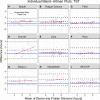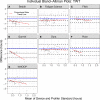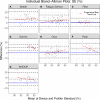Evaluations of Commercial Sleep Technologies for Objective Monitoring During Routine Sleeping Conditions
- PMID: 33149712
- PMCID: PMC7603649
- DOI: 10.2147/NSS.S270705
Evaluations of Commercial Sleep Technologies for Objective Monitoring During Routine Sleeping Conditions
Abstract
Purpose: The commercial market is saturated with technologies that claim to collect proficient, free-living sleep measurements despite a severe lack of independent third-party evaluations. Therefore, the present study evaluated the accuracy of various commercial sleep technologies during in-home sleeping conditions.
Materials and methods: Data collection spanned 98 separate nights of ad libitum sleep from five healthy adults. Prior to bedtime, participants utilized nine popular sleep devices while concurrently wearing a previously validated electroencephalography (EEG)-based device. Data collected from the commercial devices were extracted for later comparison against EEG to determine degrees of accuracy. Sleep and wake summary outcomes as well as sleep staging metrics were evaluated, where available, for each device.
Results: Total sleep time (TST), total wake time (TWT), and sleep efficiency (SE) were measured with greater accuracy (lower percent errors) and limited bias by Fitbit Ionic [mean absolute percent error, bias (95% confidence interval); TST: 9.90%, 0.25 (-0.11, 0.61); TWT: 25.64%, -0.17 (-0.28, -0.06); SE: 3.49%, 0.65 (-0.82, 2.12)] and Oura smart ring [TST: 7.39%, 0.19 (0.04, 0.35); TWT: 36.29%, -0.18 (-0.31, -0.04); SE: 5.42%, 1.66 (0.17, 3.15)], whereas all other devices demonstrated a propensity to over or underestimate at least one if not all of the aforementioned sleep metrics. No commercial sleep technology appeared to accurately quantify sleep stages.
Conclusion: Generally speaking, commercial sleep technologies displayed lower error and bias values when quantifying sleep/wake states as compared to sleep staging durations. Still, these findings revealed that there is a remarkably high degree of variability in the accuracy of commercial sleep technologies, which further emphasizes that continuous evaluations of newly developed sleep technologies are vital. End-users may then be able to determine more accurately which sleep device is most suited for their desired application(s).
Keywords: consumer sleep technologies; sleep duration; sleep efficiency; sleep staging; wearables.
© 2020 Stone et al.
Conflict of interest statement
Financial competing interests: none. Non-financial competing interests: none. The authors report no conflicts of interest for this work.
Figures









Similar articles
-
Performance of Four Commercial Wearable Sleep-Tracking Devices Tested Under Unrestricted Conditions at Home in Healthy Young Adults.Nat Sci Sleep. 2022 Mar 22;14:493-516. doi: 10.2147/NSS.S348795. eCollection 2022. Nat Sci Sleep. 2022. PMID: 35345630 Free PMC article.
-
Sleep Tracking of a Commercially Available Smart Ring and Smartwatch Against Medical-Grade Actigraphy in Everyday Settings: Instrument Validation Study.JMIR Mhealth Uhealth. 2020 Nov 2;8(10):e20465. doi: 10.2196/20465. JMIR Mhealth Uhealth. 2020. PMID: 33038869 Free PMC article.
-
Performance of a multisensor smart ring to evaluate sleep: in-lab and home-based evaluation of generalized and personalized algorithms.Sleep. 2023 Jan 11;46(1):zsac152. doi: 10.1093/sleep/zsac152. Sleep. 2023. PMID: 35767600
-
Accuracy of Wristband Fitbit Models in Assessing Sleep: Systematic Review and Meta-Analysis.J Med Internet Res. 2019 Nov 28;21(11):e16273. doi: 10.2196/16273. J Med Internet Res. 2019. PMID: 31778122 Free PMC article.
-
Accuracy of Fitbit Devices: Systematic Review and Narrative Syntheses of Quantitative Data.JMIR Mhealth Uhealth. 2018 Aug 9;6(8):e10527. doi: 10.2196/10527. JMIR Mhealth Uhealth. 2018. PMID: 30093371 Free PMC article. Review.
Cited by
-
A validation study of a ballistocardiograph sleep tracker against polysomnography.J Clin Sleep Med. 2022 Apr 1;18(4):1203-1210. doi: 10.5664/jcsm.9754. J Clin Sleep Med. 2022. PMID: 34705630 Free PMC article. Clinical Trial.
-
Deconstructing Commercial Wearable Technology: Contributions toward Accurate and Free-Living Monitoring of Sleep.Sensors (Basel). 2021 Jul 27;21(15):5071. doi: 10.3390/s21155071. Sensors (Basel). 2021. PMID: 34372308 Free PMC article. Review.
-
The Menstrual Cycle's Influence on Sleep Duration and Cardiovascular Health: A Comprehensive Review.Cureus. 2023 Oct 18;15(10):e47292. doi: 10.7759/cureus.47292. eCollection 2023 Oct. Cureus. 2023. PMID: 38022155 Free PMC article. Review.
-
[An overview on sleep research based on functional near infrared spectroscopy].Sheng Wu Yi Xue Gong Cheng Xue Za Zhi. 2021 Dec 25;38(6):1211-1218. doi: 10.7507/1001-5515.202102003. Sheng Wu Yi Xue Gong Cheng Xue Za Zhi. 2021. PMID: 34970905 Free PMC article. Review. Chinese.
-
Applying Heart Rate Variability to Monitor Health and Performance in Tactical Personnel: A Narrative Review.Int J Environ Res Public Health. 2021 Jul 31;18(15):8143. doi: 10.3390/ijerph18158143. Int J Environ Res Public Health. 2021. PMID: 34360435 Free PMC article. Review.
References
Grants and funding
LinkOut - more resources
Full Text Sources
Medical

